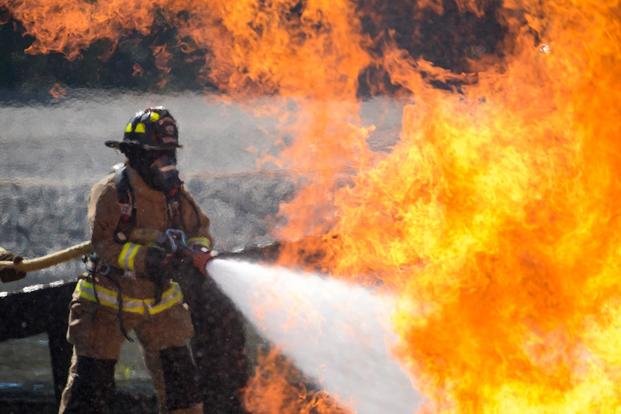Candidates who have served our country in the armed forces have a huge advantage over those who have not. It is generally believed that while military veterans may not have as many certificates and fire science units as the other candidates (they were busy serving our country), they offer so much more.
There is no substitute for life experience. The personal growth a young man or woman experiences in the military is second to none. This growth is magnified, depending on the assignments held. Many of those who joined the military at a young age grew up very rapidly when put into dangerous situations.
Related: Search for firefighter jobs.
Being assigned to the front line is not required to get "credit" for serving in the military. Fire departments realize that many support roles require dedication and commitment. While there is only one person on the nozzle that puts out the fire, numerous other assignments need to take place on the fire ground. It is important that a firefighter be willing to work in a support role for the good of the team.
The fire service is a paramilitary organization. Many of the common terms in the fire service, such as captain and lieutenant, were taken directly from the military. Words such as code, honor, commitment and integrity are as important to the fire service as they are to the military.
Men and women with military backgrounds are usually very mature, regardless of their age. They understand the need to get along with others, especially with people who come from different backgrounds than them. They understand commitment and the need to work until the job is completed. They are used to working for long periods of time in less than ideal conditions.
Physical fitness is emphasized in the military. As a result, military men and women are usually in very good shape. This is extremely important to the fire service, because the No. 1 reason that entry-level candidates fail out of the academy is because of poor physical fitness. In addition, a physically fit firefighter will miss less time due to injury than a firefighter who is not fit. Military personnel have been taught the importance of a lifelong physical fitness program and the importance of proper diet. These good habits will be shared with the firefighters in the station.
Related: To apply for jobs that match your skills, visit the Military Skills Translator.
Military people demonstrate respect for authority and understand the chain of command. The fire service operates on the same hierarchy principle as the military. The group clearly understands code and honor. These qualities are extremely important in the fire service, because firefighters are held to a higher standard than the average person in the community.
Military men and women are used to working in a structured environment. They understand the importance of doing something right the first time. Similar to the fire department, people's lives are impacted if things are not kept in a constant state of operational readiness. Firefighters must check out their equipment each and every day. They must know the intricacies of each tool kept on the engine or truck. Training and continuing education are essential to the fire service. It is imperative that firefighters can work unsupervised; completion of a job or task is a reflection of them.
Getting along in the fire station is critically important to being successful in the fire service. Courtesy to fellow firefighters is critical. Cleaning up after oneself is expected. This is one of the first things military men and women learn in basic training.
One of the strengths found in military men and women, however, is also commonly a cause of strife during their probationary year. People who have earned rank in the military are used to giving orders. As a rookie firefighter, you are expected to take orders, not give them. Humility is an extremely important quality to possess as a rookie firefighter. Oftentimes, rookie firefighters who have spent time in the military are older than the average candidate.
It is not uncommon for an older probationary firefighter to be working under the tutelage of a much younger senior firefighter, engineer, or even lieutenant or captain. If the rookie firefighter does not have the proper mindset, they will be in for a difficult probationary year.
If you are still in the military and are interested in a career in the fire service, it is important that you start making provisions now. Start taking online classes now.
If possible, put yourself in a position to get fire service-related training, such as medic or corpsman. Hazardous materials and firefighter training will also be beneficial. Lastly, work on general education courses so you can earn your associate's degree.
Do not be intimidated by candidates who have every certification imaginable. They obtained these as full-time students while you were busy fulfilling your commitment to the American people.
Related: Does your resume pass the 6-second test? Get a FREE assessment.
Find the Right Veteran Job
Whether you want to polish your resume, find veteran job fairs in your area or connect with employers looking to hire veterans, Military.com can help. Subscribe to Military.com to have job postings, guides and advice, and more delivered directly to your inbox.











